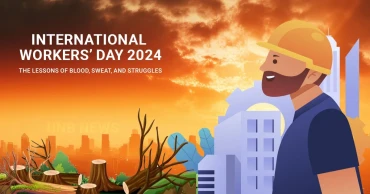International Day
Reflecting on May Day: A Global Tribute to Labour Rights and Struggles
On May 1st, communities worldwide honour International Workers’ Day, a profound tribute to the labour force that powers economies and shapes societies. Known commonly as May Day, this occasion serves as a solemn remembrance of the arduous battles fought by workers for their fundamental rights and acknowledges their ongoing contributions to civilisation.
The Origins of International Workers' Day
The roots of International Workers' Day trace back to April 21, 1856, when Australian stonemasons staged a strike in pursuit of an eight-hour workday. This act of defiance sparked a series of movements that would reshape labour rights globally.
The defining moment came on May 1, 1886, with a general strike in Chicago demanding the same eight-hour workday. This escalated into the infamous Haymarket affair, a violent confrontation resulting in the deaths of several police officers and civilians after a bomb detonated during the protest. The aftermath saw severe repercussions for labour leaders and a broadened awareness of workers' rights issues, marking a pivotal moment in labour history.
Read more: On eve of May Day, Fakhrul shines light on cheap labour's pitfalls.
Global Recognition and Solidarity
In 1889, the Second International, comprising socialist and labour parties from 20 countries, declared May 1st a day of solidarity with the Haymarket affair. From 1890 onward, May Day has been commemorated worldwide.
Why Celebrate May Day?
Historians regard the quest for an eight-hour workday as one of the most significant labour movements in Western history, symbolising a unified worker identity that transcended national borders. May Day has evolved to not only reflect on workers' struggles but also to emphasise the spirit of internationalism, showing solidarity among workers globally.
Lessons from May Day
Despite the progress achieved since the first May Day, the original goals of the movement remain partially unmet. While the eight-hour workday is widely adopted, workers worldwide still face numerous challenges requiring persistent advocacy for enhanced labour rights and broader social justice, including gender equality, racial justice, and environmental sustainability.
Read more: Experts call for including workers’ security-related provisions into labour laws
Rosa Luxemburg, a Marxist theorist, poignantly described May Day as an annual renewal of workers' demands against oppression, foreseeing a time when these demands would be fulfilled, leading to a celebration of past sacrifices and victories.
The Current State of Labour Rights
Around the world, including in Bangladesh, labour rights continue to spark intense debates, with ongoing wage disputes and inadequate working conditions. As we observe May Day, it serves as a compelling reminder of the ongoing need to advocate for and protect the rights of those who are the backbone of our economies.
Final Thoughts
International Workers' Day is not just a historical commemoration but a call to action. It encourages us to reflect on the progress made and the journeys still ahead in achieving fair and equitable labour practices globally. As May Day unfolds, let us renew our commitment to advancing the well-being and rights of all workers, honouring their indelible mark on our world.
Read more: Severe heatwave in Khulna: Day labourers forced to work in dangerous conditions
1 year ago
What is Autism spectrum disorder? Why is Autism Awareness Important?
Autism spectrum disorder (ASD) is a complex developmental condition that affects individuals in various ways. Understanding autism and raising awareness about it is crucial to creating a more inclusive and supportive society.
World Autism Awareness Day, observed on April 2, serves as a reminder of understanding and supporting individuals with autism. Let's delve deeper into the intricacies of autism and why awareness about it is important.
What is Autism?
Autism, also known as autism spectrum disorder (ASD) or autism spectrum condition (ASC), is a neurodevelopmental variation in brain functioning, influencing communication, interaction, and learning patterns. People with autism may have difficulty understanding social cues, expressing themselves verbally or nonverbally, and engaging in repetitive behaviours or interests.
Autism is a spectrum disorder, meaning that it affects each individual differently, ranging from mild to severe. It is crucial to understand that autism is not a sickness; it is a lifelong condition present from birth. Various therapies are available to assist individuals in coping with challenges and leading fulfilling lives.
Read more: Cerebral Haemorrhage: Signs, Reasons, Treatment, and Prevention
Signs of Autism
Signs of autism can vary widely among individuals, but common signs include challenges in social interaction, communication difficulties, and repetitive behaviours. Specific signs may include:
- Avoidance of eye contact - Lack of interest in pointed-out objects- Delayed language development compared to peers- Diminished engagement with others- Preference for objects over people- Difficulty participating in interactive games- Heightened or reduced sensitivity to sensory stimuli- Resistance to changes in routine- Repetitive and restricted use of toys- Echoing of words or phrases- Repetitive movements.
Read more: Why are Suicide Rates Higher Among Men?
Causes of Autism
The rising rate of autism suggests a complex interplay of factors, with genetics playing a significant role. Scientists have identified rare gene mutations and common genetic variations linked to autism. Emerging research focuses on the interaction between genetic predisposition and environmental influences.
For instance, maternal exposure to harmful substances during pregnancy could contribute to genetic mutations associated with autism. The disorder's multifaceted nature highlights the need for further investigation.
1 year ago
"Let’s proudly declare: We are all feminists"
UN Secretary-General Antonio Guterres has called on governments to increase funding by 50 per cent to women’s rights organizations and movements by 2026.
He said violence against women and girls is the most pervasive human rights violation in the world.
"Let’s take a stand and raise our voices in support of women’s rights. Let’s proudly declare: We are all feminists," he said in a message marking the International Day for the elimination of violence against women.
Every 11 minutes, a woman or girl is killed by an intimate partner or family member — and we know that other stresses, from the COVID-19 pandemic to economic turmoil, inevitably lead to even more physical and verbal abuse, Guterres said.
Read: UN chief Antonio Guterres greets people on Nowruz
Women and girls also face rampant online violence, from misogynistic hate speech, to sexual harassment, image abuse and grooming by predators, he said.
"This discrimination, violence and abuse targeting half of humanity comes at a steep cost. It limits women’s and girls’ participation in all walks of life, denies their basic rights and freedoms, and blocks the equal economic recovery and sustainable growth our world needs," said the UN chief.
Now is the time for transformative action that ends violence against women and girls, he said.
This means governments designing, funding and implementing national action plans to tackle this scourge, Guterres said.
"It means involving grassroots and civil society groups at every stage of decision-making. It means ensuring that laws are implemented and respected, so survivors see their rights to justice and support upheld.
Read: “Prejudice, racism and rising hate speech”: UN chief describes world
It means supporting public campaigns that challenge patriarchal norms and reject misogyny and violence," said the UN chief.
"And as this year’s theme — “UNITE: Activism to End Violence Against Women and Girls” — reminds us, it means standing with activists around the world who are calling for change and supporting survivors of violence," he said.
3 years ago





